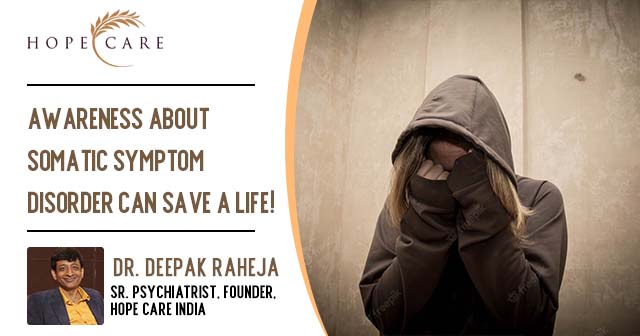Somatic Symptom Disorder or SSD is a certain type of mental illness in which a person is driven by intense, excessive and maladaptive feelings, thoughts, and behaviours. The extremity of anxiety may lead to some intentionally-produced or feigned physical symptoms, such as body aches. However, there are chances that the affected person might not be faking the symptoms or may actually develop a serious disease.
Dr Deepak Raheja, the best psychiatrist in Delhi, states that disproportionate levels of distress might affect different organs in the body and lead to many health issues. This may significantly start hampering the normal routine of the affected person, and shape a vicious cycle that may persist for years, leaving the person perplexed and worried.
The causes that might lead to SSD or somatization disorder could be substance abuse, a mental disorder, a long-term physical ailment, genetics or family history.
Symptoms
The symptoms of the disease usually occur before the age of 30. The severity of symptoms may vary and disrupt a patient’s daily life. The most common signs of SSD include:
- Pain
- Weakness or fatigue
- Breathlessness
- Anxiety disorders
- Neurologic problems
- Gastrointestinal complaints
- Sexual troubles
- Related Disorders
As per psychiatry, SSD might lead to several conditions:
Illness Anxiety Disorder: People with such disorders believe that even the most common physical ailment like a headache might turn into a serious brain tumour.
Conversion Disorder or the Functional Neurological Symptom Disorder: It is a condition in which a mental or emotional crisis (neurologic symptoms) develops and gets converted into a physical illness. The physical problems, therefore, have no underlying medical cause. These may include hearing loss, blindness, numbness or loss of sensation, paralysis, etc.
Pseudocyesis: It is the clinical term for a condition in which a woman has a false belief that she is pregnant. It may lead to certain signs and symptoms of pregnancy, such as cessation of the menstruation,nausea, fetal movement or labour pains.
Treatment
It is most likely that SSD patients might refuse to take medical help for the psychiatric factors that bother them. However, seeing a specialist is crucial. A set treatment plan and a strong physician-patient relationship can help manage the disorder before it becomes a prolongedcondition.
The treatment for SSD usually focuses on stress reduction and management. It might also include counselling to lessen the intensity of the symptoms. Special cognitive behavioural therapy for curing SSD involves the correction of unrealistic beliefs, distorted thoughts and unnecessary anxiety.
If you or any of your loved ones are having symptoms that point towards depression or anxiety, it is advisable to get medical help from an expert at the earliest. You could simply visit hopecareindia.com and book an appointmentat Hope Care India, the best psychiatrists and rehabilitation centre in Delhi.
At Hope Care, Dr. Deepak Raheja reviews each case thoroughly. The endeavour is to provide the best treatment, support, and guidance so that mental illnesses are no longer considered a taboo in the society!

Hope Care established under the guidance of Dr. Deepak Raheja, is a Psychiatric Centre of excellence that endeavors to restore hope and well-being to individuals and families afflicted by mental ill-health through comprehensive treatment and rehabilitation services. Hopecare seeks to set benchmarks in innovative programs in treatment, care, and education.

